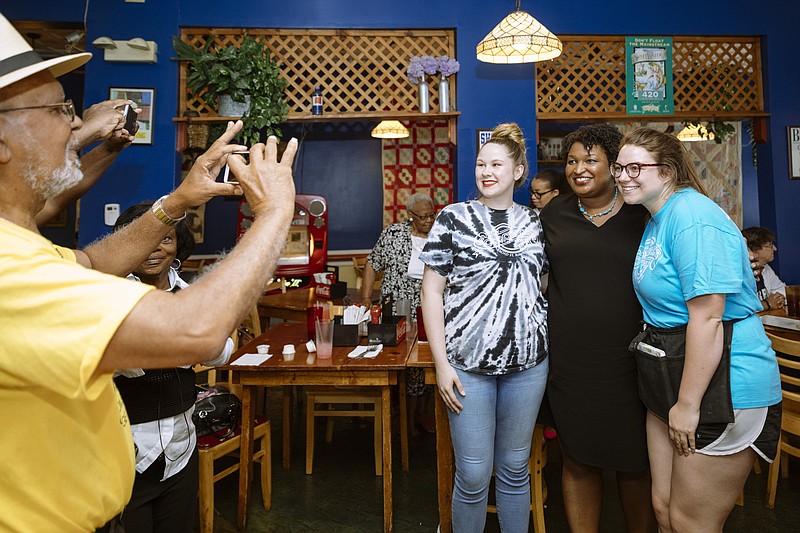And still the women keep winning.
Stacy Abrams, the history-making African-American female Democratic nominee for Georgia governor, is just one example.
Many more women are running for elected office, especially this year - the year in the echoes of Donald Trump's "hot mic" tape in which he boasts about grabbing women to kiss them and grope their private body parts. This year when the #metoo movement is still gaining steam.
In 1970, there was just one female Senate candidate. Today, there are 49 to 54 women running, depending on whether and which third-party candidates you include, according to a new count by CNN. There were 394 women running for the House and 56 in governor's races (including third-party candidates), as of last Wednesday.
Certainly more state primary elections will winnow those numbers and fewer women will appear on ballots in November.
But still: This year boasts a record share - 22 percent - of female candidates for Senate seats, a peak not seen since 1994, when the share was 19 percent.
Elle Magazine writes, "It's too early to call it the 'year of the woman' but if these first weeks of the 2018 primaries have told us anything, it's that women's electability is surging, and it could become a national trend."
Recently in Pennsylvania's primary, eight women won their House races.
But let's talk just Democrats.
Already, women have some new "firsts" goals: Come November we could see the first black female governor in the United States, the first lesbian serving in Congress from Texas, the first Democratic woman representing Kentucky in the House.
Sure the odds are tough, but what else is new? All of these scenarios moved closer to reality last week following a round of primary elections in those red states.
Look at Georgia, and not just with the crucial win of Abrams over another female primary contender. There were solid female candidates all over Georgia's Democratic primary ballot. In a state where no woman currently holds statewide elected office, Georgia on Tuesday had two Democratic women running for governor, two running for lieutenant governor, one running for secretary of state, two running for insurance commissioner, and two running for Georgia's highly visible and controversial Public Service Commission. Three out of six Democratic candidates for the 7th congressional district were women, and one is now in a July run-off race. There's also a woman in a run-off for the 6th District.
In Georgia's 180-member House of Representatives, 34 Democratic women signed up to compete for seats previously held by Republicans. This is on the heels of Georgians electing the first two Latina and the first Vietnamese female state representatives, joining other African-American and white women elected to the state legislature in 2016 and 2017.
Georgia Republicans usually out-vote Georgia Democrats in primaries by about 290,000 votes. This year, it was 54,000.
Democrats are said to have struggled to find a voice in recent elections. We're not so sure.
Hillary Clinton won the popular vote in 2016. And Donald Trump has done much to help Americans realize that pocketbook issues are not just for rich people, D.C. swamp politics or tribalism.
But there's still much work to do, and perhaps nowhere more so than Tennessee - one of the bottom five states for percentages of female candidates running for Senate since 1994. (This year two women are seeking high office in the Volunteer State, but both are Republican Trump cutouts.)
Let's not take the good old boys' networks for granted, Democrats.
As Stacy Abrams said Tuesday after she won the nomination in Georgia:
"In the book of Esther, there's a verse that reminds us - we were born for such a time as this."
